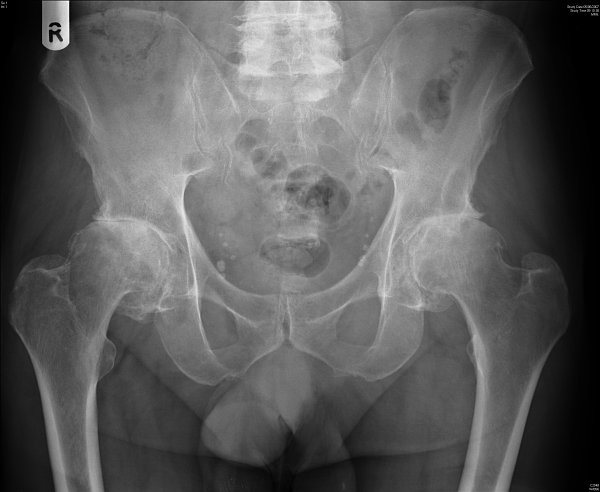Third genetic link to osteoarthritis discovered

The disease-associated variant, in the gene MCF2L, was discovered when Wellcome Trust Sanger Institute researchers used data from the 1000 Genomes Project to increase the power of their genome-wide association scan. The preliminary stage of the original arcOGEN study, funded by Arthritis Research UK, compared the genomes of 3,177 people with osteoarthritis with 4,894 people from the general population and looked at 600,000 variants.
At that level of detail, no new genes were identified (although the full study has yet to be published). By imputing the data from the 1000 Genomes Project, the new study was able to scan for 7.2 million variants and revealed the association of MCF2L with osteoarthritis without requiring any new sequencing to be carried out.
“By using the 1000 Genomes Project data to add value to our original genome-wide association scan for osteoarthritis, we have uncovered a disease-associated gene that had previously remained hidden. We were able to analyse our results in greater detail and zoom in on variants that we hadn’t been able to identify before. We hope that this approach and our findings will help to improve our biological understanding of this very painful disease.”
Dr Eleftheria Zeggini Senior author from the Wellcome Trust Sanger Institute
Osteoarthritis is a complex condition and researchers have found it difficult to identify its genes. Only two loci have been found so far in European populations – GDF5 and a signal from a region on chromosome 7.
The newly identified gene, MCF2L, is found on chromosome 13 and regulates a nerve growth factor (NGF). It has been reported that when people with osteoarthritis in the knee are treated with a humanized monoclonal antibody against NGF, they experience less pain and show improvement in their movement. This suggests that MCF2L is involved in the development of osteoarthritis and provides a new focus for future research.
To ensure that the variant of MCF2L is associated with the development of osteoarthritis, the team worked with international collaborators to investigate 19,041 people with arthritis and 25,504 people without the condition. A number of centres across Europe collaborated by screening people in Iceland, Estonia, the Netherlands and the UK for the newly identified variant to corroborate the association.
“The discovery of this MCF2L variant suggests a possible genetic link to the finding that regulating NGF is important in knee osteoarthritis, and is supported by the fact that the variant is more strongly associated with knee osteoarthritis than hip osteoarthritis in the study. We hope the identification of this variant will lead to further insights into the biological processes at work and offer potential treatment targets.”
Aaron Day-Williams First author of the study from the Sanger Institute
The study’s findings are based on the work of the arcOGEN Consortium, which has been funded by Arthritis Research UK and is a vital supporter of research in this area.
“Osteoarthritis is a complex disease with many genetic causes. Yet it has proved very difficult to find the genes involved and help us to identify potential areas of treatment. We are delighted that researchers at the Sanger Institute have been able to identify a new gene associated with this painful condition and offer new lines of research for possible treatments. We are also excited that employing the technique of using the 1000 Genomes Project data to investigate genetic associations in far greater depth could reveal even greater insights into this debilitating disease.”
Alan Silman Medical Director of Arthritis Research UK
More information
Funding
This work was supported by Arthritis Research UK and the Wellcome Trust.
Participating Centres
For a full list of participating centres, please see the American Journal of Human Genetics website.
Publications:
Selected websites
Arthritis Research UK
Arthritis Research UK is the charity leading the fight against arthritis. The fourth largest medical research charity in the UK, it funds research into all types of arthritis and musculoskeletal conditions, aiming to take the pain away for people with arthritis, and helping them to remain active. It also has a strong educational remit, providing information for patients and campaigning on their behalf.
The Wellcome Trust Sanger Institute
The Wellcome Trust Sanger Institute, which receives the majority of its funding from the Wellcome Trust, was founded in 1992. The Institute is responsible for the completion of the sequence of approximately one-third of the human genome as well as genomes of model organisms and more than 90 pathogen genomes. In October 2006, new funding was awarded by the Wellcome Trust to exploit the wealth of genome data now available to answer important questions about health and disease.
The Wellcome Trust
The Wellcome Trust is a global charitable foundation dedicated to achieving extraordinary improvements in human and animal health. We support the brightest minds in biomedical research and the medical humanities. Our breadth of support includes public engagement, education and the application of research to improve health. We are independent of both political and commercial interests.


